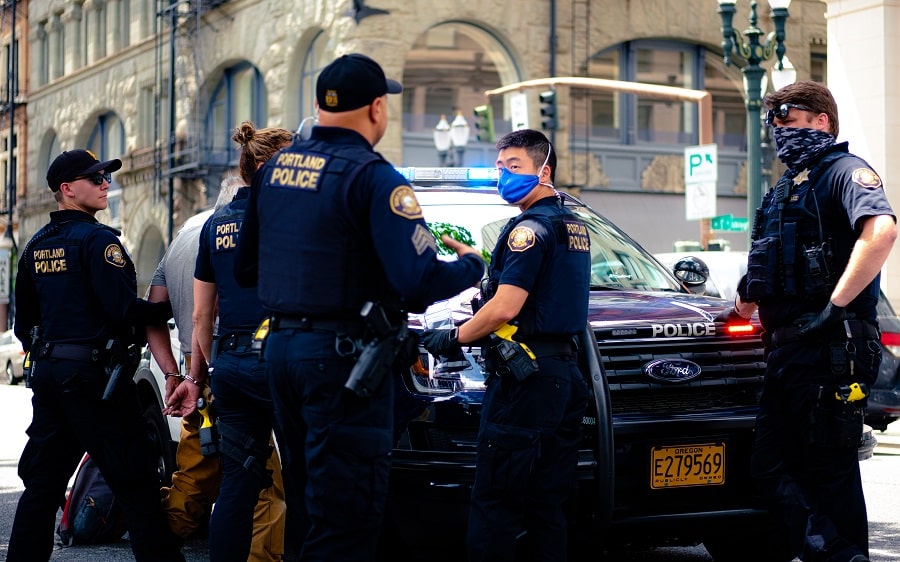If you’ve ever wondered, “What is the Miranda warning?” chances are you’ve heard it before without realizing it. That famous paragraph cops recite to criminals in movies or TV shows that begin with the line ‘You have the right to remain silent” is part of the Miranda Warning.
While used often in cinematic instances, this warning or reading of your rights is very real and is read to an individual by an arresting officer. So, what are Miranda Rights? Let’s take a look.
Who Is Ernesto Miranda?
So, why is it called Miranda Rights? The reading of this warning stems from a 1966 court case known as Miranda v. Arizona. The defendant, 24-year-old Ernesto Miranda, was accused of kidnapping, robbing, and raping an 18-year-old girl. Following his arrest, Miranda was subject to a two-hour interrogation, where he confessed to the crimes.
However, Miranda’s defense attorneys contended that law enforcement had not clearly informed the defendant of his right to have a lawyer present and against self-incrimination, which falls under the Sixth Amendment. Further, Miranda’s lawyers argued that because his rights had not been made clear to him and he was under the duress of detainment, the court should not deem his confession admissible.
In a landmark decision, the Supreme Court ruled that the Arizona Supreme Court decision that Miranda’s confession is admissible must be overturned, forever changing criminal proceedings in the US.

Why is it Called Miranda Rights?
So, why is it called Miranda Rights? Since the Supreme Court ruling in 1966, it has become a constitutional requirement that police inform arrestees of their rights. Because this requirement stems from the Miranda court ruling, these rights earned the name “Miranda Rights.”
Watch the Video to learn more.
What are Your Miranda Rights?
Miranda extends the following rights to suspects in criminal investigations:
- the right to remain silent;
- anything said by the person in custody can and will be used against him/her in court;
- the right to an attorney; and
- the right to have an attorney appointed if the person cannot afford one.
The right to remain silent means the person under interrogation can decline to respond to police questions at any point. Thus, even if a person decides to answer some questions, he/she can later choose to invoke this right and refuse further to answer additional inquiries.
The warning about any statement being used against the individual in court should be taken at face value, with the knowledge that this information will be presented in the most negative way possible to increase the chances of a guilty verdict.
The right to an attorney means that once this right is asserted police must stop additional questioning until the attorney is present. Note that the person under interrogation needs to affirmatively assert this right, and not just suggest an attorney may be a good idea. Once this right is invoked, the person under questioning should refrain from talking until the attorney arrives.
While people commonly assume these rights only apply to adults, California law extends these same protections to minors who are wards of the state or juvenile offenders. If the police take one of these minors into temporary custody, they must be informed of their rights just like adults.
What Do the Cops Say When They Arrest You?
So, what is the Miranda Warning, and what do cops say when they arrest you? When you are read your rights or “Mirandized,” the arresting officer must clearly and directly inform you of the following:
“You have the right to remain silent. Anything you say can and will be used against you in a court of law. You have the right to an attorney. If you cannot afford an attorney, one will be appointed for you.”
A waiver then follows this paragraph:
“Do you understand the rights I have just read to you? With these rights in mind, do you wish to speak to me?”
Following this, you may advise the officer whether you wish to have an attorney or waive your rights and speak with them without a lawyer present.
Additionally, if English is not your spoken language, police officers must translate these rights into a language you understand.
Do You Need to Respond to Police Questioning?
While you are required to identify yourself to officers, you have the constitutional right to remain silent. As a result, law enforcement officers cannot punish you for refusing to speak to the police.
When are Miranda Rights Not Required
Do cops have to read Miranda Rights all the time, or are there instances when Miranda Rights are not required? Firstly, why are Miranda Rights important? These warnings advise arrestees that they may have access to a lawyer in a criminal case. However, officers do not need to read your Miranda
Rights if they are arresting you without the intent to interrogate you, for instance, if you are being arrested for a DUI.
Arrest Without the Reading of Miranda Rights
If a detainee is arrested but not informed what their Miranda rights are, anything they say during questioning cannot be used as evidence in a trial. If you require a Criminal Defense Attorney and need help defending your rights, contact us for sound legal counsel.


